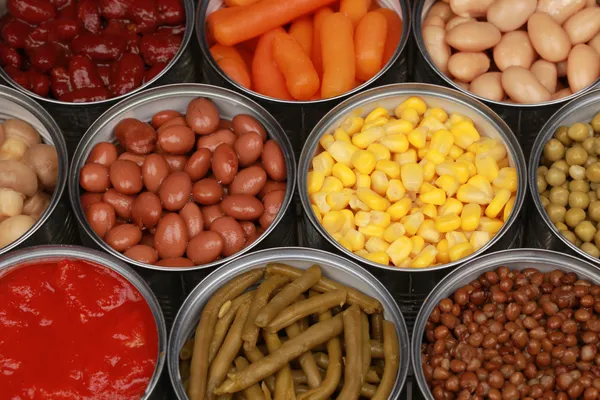Pregnancy is a time of heightened awareness when it comes to food choices. Expectant mothers often find themselves scrutinizing their diets with a fine-tooth comb, searching for the best ways to nourish both themselves and their developing baby. In this quest for nutritional excellence, the question inevitably arises: Are Canned Foods Safe During Pregnancy?
Canned foods have become a staple in modern kitchens due to their convenience and long shelf life. However, their safety during pregnancy is a matter of concern for many mothers-to-be. In this article, we will delve into the pros and cons of consuming canned foods during pregnancy, shedding light on the potential benefits and risks associated with these pantry essentials.

The Pros of Canned Foods During Pregnancy
1. Nutrient Retention
One notable advantage of canned foods is their ability to retain nutrients over time. The canning process involves sealing food in an airtight container, which effectively preserves the vitamins and minerals within. This means that canned vegetables, fruits, and legumes can offer a significant nutritional boost during pregnancy.
2. Convenience
Pregnancy often brings with it fatigue and a lack of energy. On days when cooking feels like an insurmountable task, canned foods can be a lifesaver. They require minimal preparation and can be quickly incorporated into various dishes, ensuring that you maintain a balanced diet without overexerting yourself.
3. Long Shelf Life
Another advantage of canned foods is their extended shelf life. Canned goods can sit on your pantry shelf for months or even years without spoiling. This longevity not only reduces food waste but also provides a safety net for those times when fresh produce may be scarce or too expensive.
4. Protection Against Foodborne Illnesses
Canned foods undergo a thorough sterilization process, which eliminates harmful bacteria and pathogens. This extra layer of protection can be especially reassuring during pregnancy when the immune system is more vulnerable. It reduces the risk of foodborne illnesses that can have severe consequences for both mother and baby.
The Cons of Canned Foods During Pregnancy
1. BPA Exposure
One of the most significant concerns associated with canned foods is the potential exposure to Bisphenol A (BPA). BPA is a synthetic compound used in the lining of some canned goods, and it has raised alarm bells in recent years due to its potential health risks. Research suggests that high levels of BPA exposure may be linked to developmental issues in fetuses.
2. High Sodium Content
Canned foods are often packed with salt as a preservative. Excessive sodium intake during pregnancy can lead to high blood pressure and water retention, potentially increasing the risk of complications such as preeclampsia. It’s crucial for expectant mothers to monitor their sodium intake carefully when consuming canned products.
3. Loss of Texture and Flavor
The canning process can alter the texture and flavor of some foods. Vegetables, in particular, may become softer and lose some of their natural taste. This can make it less appealing for some pregnant women who are already dealing with changes in their taste preferences due to hormonal fluctuations.
4. Limited Variety
While canned foods offer convenience, they may not provide the same variety of nutrients as fresh foods. A diet heavily reliant on canned items may lack the diverse range of vitamins and minerals needed for a healthy pregnancy. It’s essential to balance canned goods with fresh, frozen, and other minimally processed options.
Making Informed Choices
As an expectant mother, navigating the pros and cons of canned foods can be challenging. However, with some thoughtful considerations and precautions, you can incorporate them into your diet safely.
Tips for Safe Consumption of Canned Foods During Pregnancy
- Read Labels: Look for BPA-free canned products whenever possible. Many companies have started to use alternative linings that do not contain BPA.
- Rinse Canned Vegetables: If you’re concerned about the sodium content of canned vegetables, rinse them thoroughly under running water before cooking or eating. This can help reduce the salt content.
- Moderation is Key: While canned foods can be a convenient option, aim for a balanced diet that includes fresh, frozen, and minimally processed foods. Variety is essential for meeting your nutritional needs during pregnancy.
- Consult Your Healthcare Provider: If you have specific concerns about canned foods or dietary restrictions during pregnancy, don’t hesitate to consult your healthcare provider. They can offer personalized guidance based on your unique situation.
- Consider Home Canning: If you’re passionate about preserving food and want more control over the canning process, you might explore home canning methods. This allows you to choose your ingredients and avoid potential additives like BPA.
Final Thoughts
In the grand scheme of your pregnancy journey, canned foods can be a valuable resource. They provide convenience and nutrient retention, making it easier to maintain a balanced diet. However, it’s essential to be aware of the potential drawbacks, such as BPA exposure and high sodium content, and take steps to mitigate these risks.
Ultimately, the key to a healthy pregnancy diet lies in balance and informed choices. By understanding the pros and cons of canned foods and taking appropriate precautions, you can make confident decisions about what goes on your plate during this crucial time in your life.
So, to answer the question, “Are Canned Foods Safe During Pregnancy?”—yes, they can be safe when consumed in moderation and with careful consideration of the factors mentioned in this article. Your pregnancy diet should be a well-thought-out blend of various food sources, including canned goods, to ensure both your well-being and that of your growing baby.
Read Related Also: Why Should I Switch My Lifestyle: The 8 Steps To A Healthy Lifestyle That Will Have You Looking And Feeling Great







1 comment
Comments are closed.